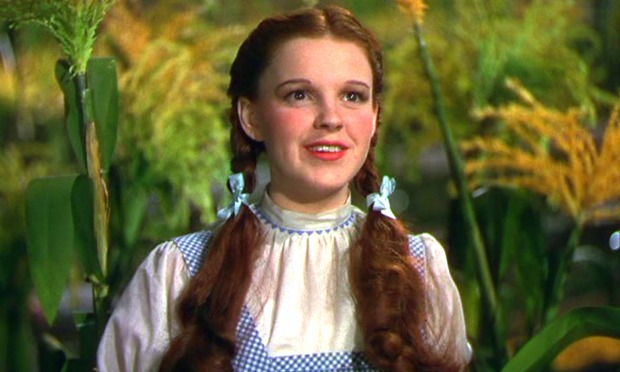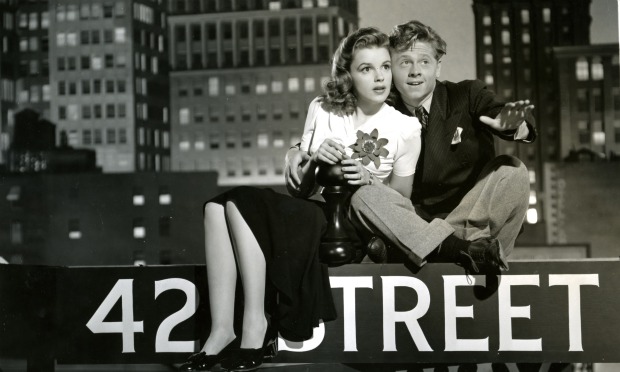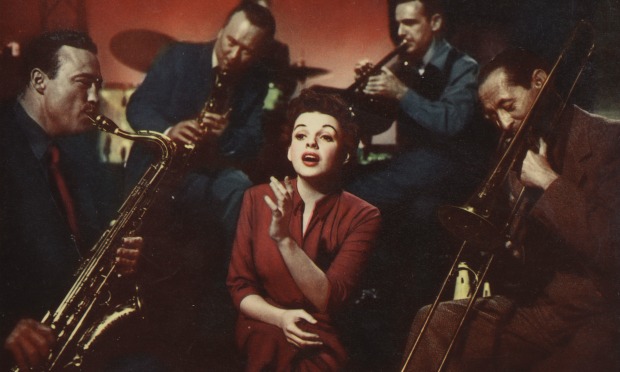This year marks the 75th anniversary of Judy Garland's silver screen debut in the 1936 musical “Pigskin Parade.” In New York, Lincoln Center and the Paley Center for Media are honoring the legendary star with film and television retrospectives.
On Tuesday, the Film Society of Lincoln Center will kick off a comprehensive retrospective of feature films, featuring all 31 films Garland acted in — from Dorothy in “The Wizard of Oz” in 1939 to Esther Blodgett in “A Star is Born” in 1954.
The Paley Center for Media's series, “Judy Garland: The Television Years,” documents her television appearances. Included are episodes of her own show, "The Judy Garland Show," which was on the air from 1963 to 1964, as well as appearances on programs such as "The Ed Sullivan Show."
To shed some light on Garland and her legacy, WNYC's Marlon Bishop spoke with John Fricke, a Garland historian who has written six books about the star Judy Garland and “The Wizard of Oz.” Fricke's latest book, “Judy: A Legendary Film Career,” will be published in August. He will also be introducing many of the films at Lincoln Center’s Judy Garland Retrospective, and fielding questions at informal Q&As after the screenings.
WNYC's Marlon Bishop: To start, how did you become the authority on Judy Garland?
John Fricke: It’s the craziest thing, because it all started with I was 5 years old. Like so many kids I saw “The Wizard of Oz” on TV but from that I got interested in the girl who played Dorothy, especially after I found out she made a lot of other movies and a lot of records. It was a hobby that started forming when I was a pre-teen and then was never supposed to become a career but it has led to now six books and documentaries and DVD commentary tracks and CD liner notes and lectures and all sorts of stuff.
MB: What makes Judy Garland special? What makes her such an important figure in the American cultural imagination?
JF: Well, I think you look at Judy’s career on so many levels. You think of her as Dorothy in “The Wizard of Oz.” There are very few movie stars of her generation who have that iconic kind of role and recognition for all ages. Now as we get older, if you are into film, you are going to know Jimmy Stewart from “It’s Wonderful Life” and you might know things like “Gone with the Wind” or “Citizen Kane.” But it would be impossible to find anyone over the age of 3 who doesn’t know who Dorothy is.

Judy Garland in "The Wizard of Oz" (1939) (Courtesy of Film Society of Lincoln Center)
It becomes so interesting I think to people because she is — and this is a word that everybody always uses to define her — she is so real as an actress. She is always so honest in what she’s doing as a singer or as an actress. There is no fourth wall. She grew up in that vaudeville tradition where you went out and did it for the audience. And through some god-given amalgam of talent and charisma, all translates onto video tape. A lot of actors don’t have that. I think it also helps that she was absolutely the best at what she did. Nobody else had quite the combination of singing, dancing, acting and comedy talent at MGM or anywhere else. One of the nice points of what this retrospective brings up is that Judy worked for 45 of her 47 years. Forty of those years, from 1929 to 1969, are captured on film.
MB: What differentiated her from other stars of the time?
JF: I think a lot of it again has to do with that realty. Elaine Stritch, the brilliant actress and singer, always said she watches Judy before she goes out to perform because it reminds her to go out there and be honest, not to lie as an actress. If you look back at the leading ladies of film in the 1930s, ‘40s, and ‘50s, there’s a lot of acclaimed performances. But it’s acting. And Judy is just being. She’s just there as herself, and intrinsically, she herself was such a compassionate, vulnerable, funny, electric human being that it makes her exciting to watch and makes her interesting.

A still from Busby Berkley's "Babes on Broadway" (1941) (Courtesy of Film Society of Lincoln Center)
MB: She was also a very troubled figure in her personal life — dealing with mental illness, drug addiction...
JF: I think a lot of Judy’s troubles have to be kept in perspective. There are a lot of people in the course of history that die young, who marry more than once, and who have had substance abuse issues. Her problem was never recreational drugs, it was the stuff prescribed for her from the time that she was a kid to help her lose weight, to help her to meet filming schedules, to help her to sleep because the other medication kept her so revved up. It’s a trap into which she unfortunately fell into, and out of which there was no help. There were no Betty Ford Centers in her lifespan — this was all very kind of secretive and embarrassing to public figures. They weren’t supposed to acknowledge that they had these kinds of problems. So she had to rise above that. When you look at what Judy did in her lifetime. And now, 42 years after she died, it is still being venerated and enjoyed. That’s an achievement. And to me that’s why she’s important.
MB: I imagine this is difficult for someone who has devoted so many years to the study of Judy Garland’s career, but can you be pressed to pick a favorite Garland film and tell us why?
JF: I don’t think I can pick a favorite. There the ingénue stuff with Mickey Rooney. There are the young leading lady roles at MGM. There’s the bravura things like “A Star Is Born.” There is the Academy Award nomination she earned for “Judgment at Nuremberg,” a straight dramatic part. And again, you factor in her TV work, her series from 1963 to '64, and you are going to hear and see the best popular vocal performing and interpretation that has ever been put forth. Not that I’m a fan [laughs]
MB: I imagine 99 percent of people are most familiar with “The Wizard of Oz.” What’s another role that’s surprising or interesting that she’s done?
JF: Anybody that just knows her from “The Wizard of Oz” is going to be blown away by something like “A Star is Born.” It was called the “Gone With the Wind" of musicals.” It’s a three-hour roadshow movie about life in Hollywood, about a girl singer with a band that rises to Hollywood stardom. And the actor who helps her do this is having a career decline at the same time. And the sacrifices they want to make for each other, the very bittersweet story of romance and how difficult it is to hold on to romance against the pressures of that industry. Certainly you’re not going to find a more versatile role for Judy than that film.

Still from "A Star is Born" (1954) (Courtesy of Film Society of Lincoln Center)
For a full schedule of film screenings at Lincoln Center, click here. For a full schedule of television screenings at the Paley Center, click here. Plus, let us know your favorite Judy Garland on-screen moment by posting a comment below.